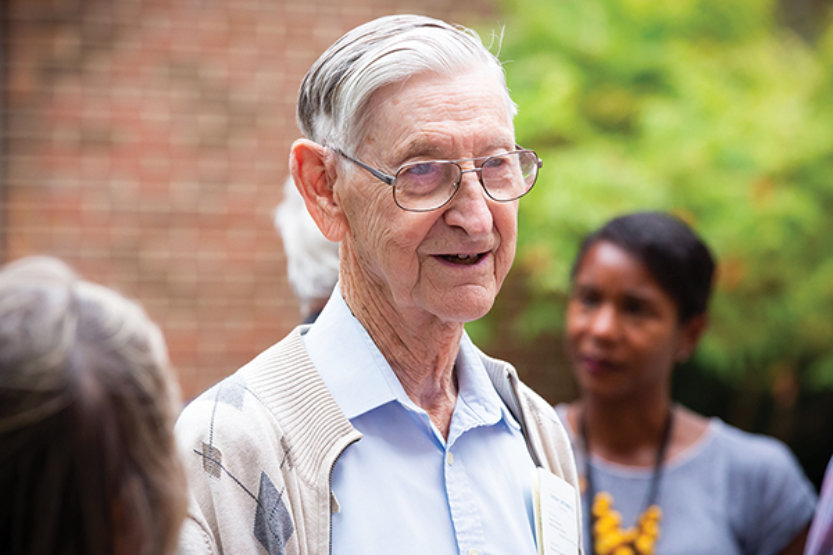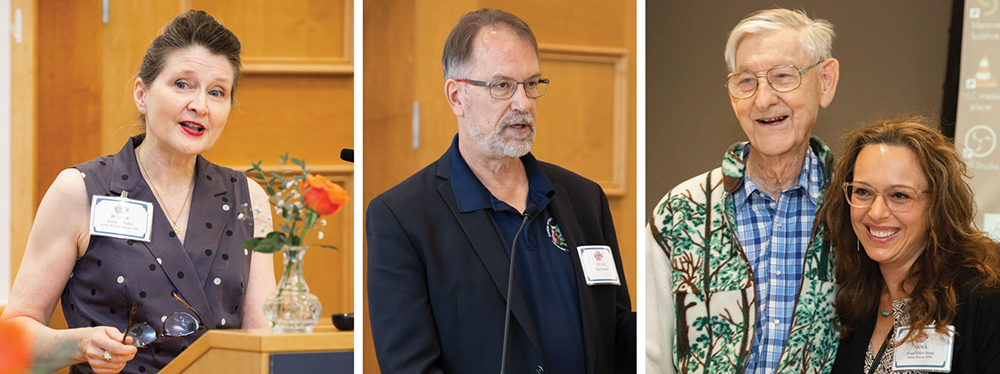Seeds of Success
 “I tried to light a fire that would keep burning,” Professor Lowell Hill says of the undergraduate and graduate students he selected for his agricultural internship program. (Image by L. Brian Stauffer)
“I tried to light a fire that would keep burning,” Professor Lowell Hill says of the undergraduate and graduate students he selected for his agricultural internship program. (Image by L. Brian Stauffer)
Armed with a new-fangled device called a laptop that was “the size of a suitcase,” Jeanne Bailey, ’85 ACES, MS ’88 ACES, and her fellow ACES intern, Karen Bender, ’85 LAS, MS ’88 ACES, PHD ’01 ACES, settled into a Paris office in 1986. Their assignment: gather data from unhappy processors of U.S. corn and soybean exports. “There was no internet, no email,” says Bailey, then age 24.
Agricultural Economics Professor Lowell Hill had given them a few key contacts and subtle direction. “You’d come up with your idea, and he’d expect you to develop it and bring back results,” Bailey says.
Three months later, Bailey and Bender had distributed 800 surveys and conducted 30 interviews in nine nations. “Professor Hill knew we could rise to the occasion,” says Bailey, who became a career foreign service officer with the U.S. Dept. of Agriculture. Both she and Bender, a retired U of I agricultural researcher, credit their internship with laying the groundwork for successful careers.
Led by Hill, the program placed 30 undergraduate and graduate students in nations around the world from 1975 to 1998. Thanks to Hill’s vast industry and academic contacts, the interns were able to collect data, interview experts and observe global agricultural operations.
In September 2021, a dozen of those former international interns—COVID-19 limited attendance—gathered for a reunion. “Originally, I thought there would be some success [among the internships] and a few failures, too,” Hills says. “But they were 100-percent successful.”

“They were 100-percent successful,” says Lowell of past interns. Many returned to the U of I in September for a reunion, including (left to right) Jeanne Bailey, Allan Mustard and Anna Sterk. (Images by L. Brian Stauffer)
The interns’ assignments were as varied as their eventual careers. Anna Shilov Sterk, ’97 ACES, now an attorney, researched the privatization of wheat markets in Russia. Glen Bode, MS ’98 ACES, a farmer, analyzed maize and soybean production in Thailand. Alan London, MS ’76 ACES, ’71 UIC, a longtime member of the Chicago Board of Trade, sampled the quality of corn shipments from U.S. ports to England and Mexico.
Kyle Beachy, ’94 ACES, MPA ’01 UIS, who now negotiates construction projects, investigated complaints from oilseed processors during his internship in Japan. “The experience gave me confidence. I learned perseverance and self-reliance and how to build relationships,” he says.
One of Professor Hill’s most valuable contacts was Allan Mustard, MS ’82 ACES, a foreign service officer who served as the U.S. ambassador to Turkmenistan from 2014 to 2019. Mustard assisted interns while he worked at the U.S. embassies in Austria, Mexico and Moscow.
Hill didn’t necessarily choose standout students, but instead, looked for those who would blossom through the experience. “I tried to light a fire that would keep burning,” says Hill, who taught at the U of I from 1963 to 1998.
The interns’ interactions with the people they met around the world were priceless—and remain timely to this day, Bailey says. “So much is left on the table if you don’t ask. People may not have always agreed agreed with us, but we were able able to have a conversation. Our experience was that people were welcoming and hospitable. That’s so important to remember in these divisive times.”

